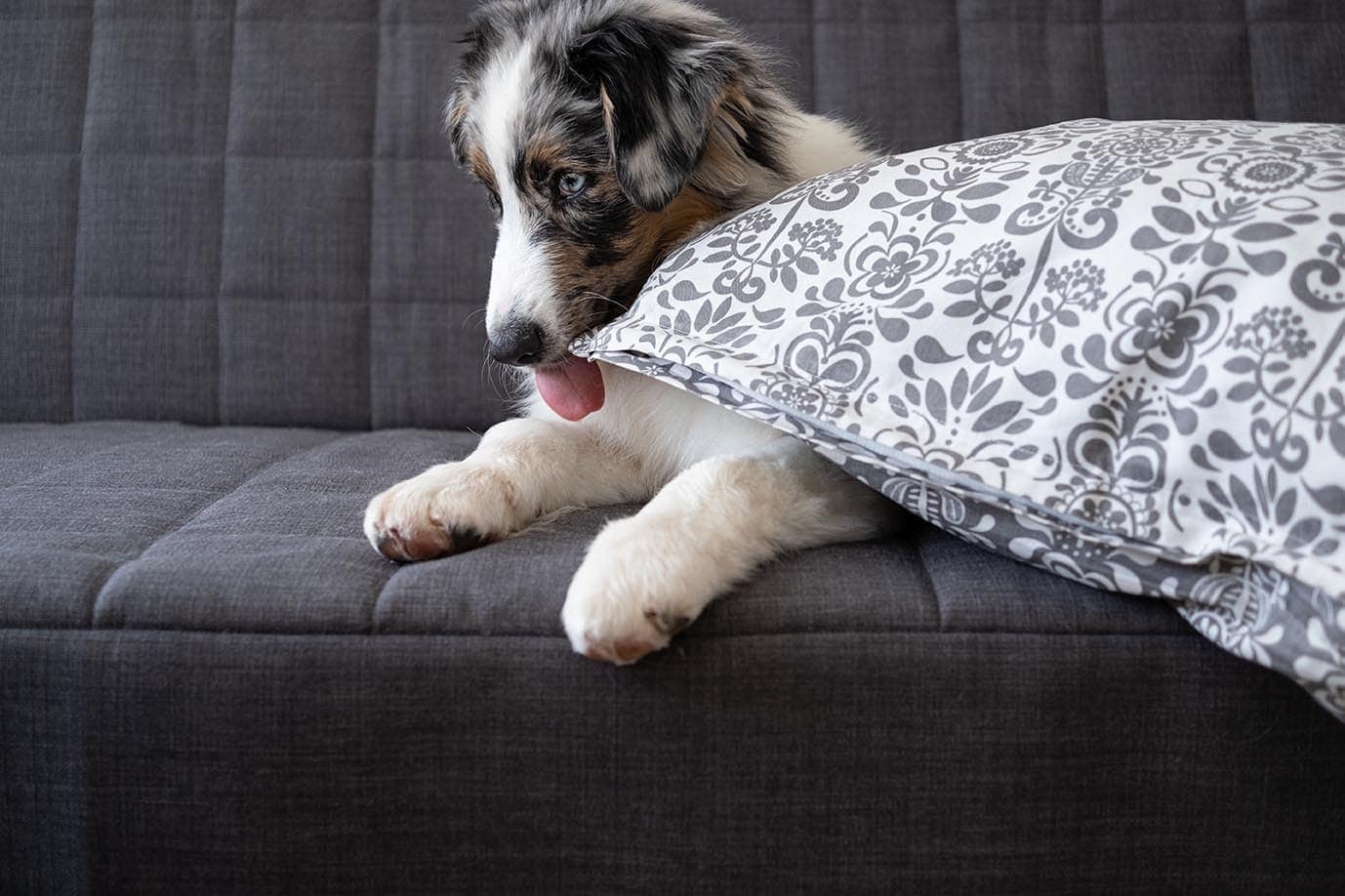Home>Furniture>Bedroom Furniture>Why Does My Dog Like To Sleep On My Bed


Bedroom Furniture
Why Does My Dog Like To Sleep On My Bed
Modified: December 21, 2023
Discover why your dog loves sleeping on your bed and the importance of providing comfortable bedroom furniture for them.
(Many of the links in this article redirect to a specific reviewed product. Your purchase of these products through affiliate links helps to generate commission for Storables.com, at no extra cost. Learn more)
Introduction
Welcome to the wonderful world of dogs and their unique sleeping habits. Many dog owners have experienced the phenomenon of their furry friend gravitating towards their bed for a cozy snooze. But have you ever wondered why your dog prefers to sleep on your bed?
In this article, we will explore the various reasons why dogs find comfort in sleeping on their human’s bed. From the need for security and companionship to the desire for a warm and familiar space, there are several factors at play that contribute to this behavior.
So, let’s dive in and unravel the mystery behind why your beloved canine friend loves to curl up on your bed!
Key Takeaways:
- Dogs love sleeping on their owner’s bed for comfort, security, and social connection. Understanding their needs and behaviors can strengthen the bond between you and your furry companion.
- Providing a comfortable alternative, setting consistent rules, and seeking professional help if needed can address the issue of dogs sleeping on your bed. Gradual transition and positive reinforcement can assist in establishing new sleep patterns.
Read more: Why Does My Dog Prefer To Sleep On The Floor
The Comfort Factor
One of the primary reasons why dogs love sleeping on their owner’s bed is simply because it offers them a level of comfort that other sleeping spots may not provide. Your bed is likely soft and cozy, with plush blankets and pillows that create a luxurious environment for a good night’s sleep.
Additionally, your body heat warms up the bed, making it an inviting and comfortable spot for your dog to snuggle up. Dogs have a higher body temperature than humans, so the warmth from your bed helps regulate their body temperature and keeps them cozy throughout the night.
Moreover, the familiar scent of your bedding and the proximity to your scent offers a sense of security and reassurance to your dog. Dogs have a keen sense of smell, and your scent provides them with a familiar and comforting presence, making your bed an irresistible sleeping spot.
Another aspect of comfort is the physical closeness and contact with you. Dogs are social animals and enjoy being near their human companions. Sleeping on your bed allows them to be near you, providing a sense of comfort and connection.
Overall, the comfort factor plays a significant role in your dog’s decision to sleep on your bed. The softness, warmth, familiar scent, and proximity to you all contribute to creating a sleeping oasis that your dog finds incredibly inviting.
Bonding and Security
Dogs are highly social animals that thrive on companionship and a sense of belonging. Sleeping on your bed provides them with a feeling of closeness and strengthens the bond between you and your furry friend.
By allowing your dog to sleep on your bed, you are essentially giving them a special place in your life and a sense of belonging to your pack. This can significantly enhance the emotional connection between you and your canine companion.
Furthermore, sleeping in close proximity to you provides a sense of security for your dog. Your bed becomes a safe and comforting space where they feel protected and at ease. Dogs are instinctively pack animals, and being close to their pack leader (in this case, you) brings them a sense of security and reduces anxiety.
Sharing a sleeping space also reinforces the trust and dependency your dog has in you. They rely on you for their safety and well-being, and being allowed on your bed strengthens that bond of trust and reassurance.
It’s important to note that some dogs may have a more pronounced need for security, such as rescues or dogs with separation anxiety. For these canines, sleeping on your bed may provide them with the emotional support they require to feel calm and secure during the night.
Ultimately, sleeping on your bed allows dogs to feel connected, secure, and bonded with their human companions, promoting a strong and trusting relationship.
Scent and Familiarity
One fascinating aspect of a dog’s behavior is their reliance on scent. Dogs have an incredible sense of smell that allows them to navigate the world and interpret their surroundings. When it comes to sleeping on your bed, scent plays a significant role.
Your bed carries your scent, which is not only comforting for your dog but also familiar. Dogs rely heavily on scent recognition to identify and differentiate between people and objects. Your scent provides them with a sense of familiarity and a connection to you.
When your dog sleeps on your bed, they are surrounded by your scent, creating a comforting and reassuring environment. This can be particularly beneficial for dogs who experience separation anxiety or those who feel stressed when left alone.
Additionally, dogs are known for their territorial instincts. By sleeping on your bed, they are essentially marking it as part of their territory. This territorial behavior is a way for your dog to establish their presence and protect their sleeping space.
Moreover, the familiar scent of your bed helps to create a sense of calmness and relaxation for your dog. The familiar smells associated with your bed act as a soothing and familiar backdrop for them, promoting a peaceful sleep.
It’s also worth mentioning that a dog’s sense of smell is much more sensitive than ours. So, while we may not notice the lingering smells on our sheets, our dogs certainly can. This can make sleeping on our beds even more enticing for them.
Overall, the combination of scent and familiarity plays a significant role in why dogs are drawn to sleeping on their human’s bed. The comforting smell of their human, the establishment of territory, and the sense of calmness all contribute to their preference for this sleeping spot.
Social Connection
Dogs are social creatures that thrive on companionship and being part of a pack. Sleeping on your bed provides them with a heightened sense of social connection and a feeling of inclusion within the family unit.
By allowing your dog to sleep on your bed, you are essentially inviting them into your personal space. This reinforces the idea that they are a valued member of the family and strengthens the bond between you and your furry friend.
For dogs, being close to their human during sleep promotes a deep sense of emotional connection and reassurance. They feel secure and content knowing that they are not alone and that their beloved human is right there with them.
Furthermore, sharing a sleeping space with your dog can also enhance their overall well-being. Dogs are known to experience separation anxiety when left alone, and sleeping on your bed can help alleviate those feelings of distress and loneliness.
Dogs are intuitive animals, and they pick up on our emotions and energy. When they sense our presence and feel our warmth while sleeping on our bed, it provides them with a sense of calm and comfort. This can help reduce anxiety and promote better sleep for both you and your furry companion.
Additionally, sleeping together on your bed allows for physical touch and closeness, which releases feel-good hormones like oxytocin. Oxytocin is known as the “love hormone” and is associated with feelings of happiness, bonding, and trust.
Ultimately, sleeping on your bed fosters a deeper social connection between you and your dog. It reinforces the idea that they are part of your family unit and provides them with the emotional support and companionship they crave.
To discourage your dog from sleeping on your bed, provide a comfortable alternative sleeping spot nearby, such as a cozy dog bed. Consistency and positive reinforcement will help your dog learn to sleep in their own space.
Read more: Why Do Dogs Sleep At The Foot Of The Bed
Temperature Regulation
Another reason why dogs may prefer to sleep on their human’s bed is the benefit of temperature regulation. Dogs have different temperature preferences compared to humans, and sleeping on your bed allows them to find the optimal comfort zone.
During colder months or in cooler climates, your bed provides warmth and insulation for your dog. Dogs have a higher body temperature than humans, and the heat generated by your body helps them stay cozy and comfortable throughout the night.
On the other hand, during warmer months or in hotter climates, your bed may be cooler and offer relief from the heat. Dogs cannot regulate their body temperature as efficiently as humans, so sleeping on a cooler surface can be refreshing for them.
Additionally, dogs have a natural instinct to seek out heat sources when they feel cold. Your bed provides them with a warm and secure spot to curl up and regulate their body temperature, saving them from seeking alternative warm spots around the house.
Moreover, some dog breeds naturally have a higher sensitivity to temperature changes. Breeds with short coats or hairless breeds, for example, may seek out the warmth of your bed to compensate for their lack of natural insulation.
By sleeping on your bed, dogs can take advantage of the temperature-regulating benefits it offers. They can find warmth, comfort, and relief from extreme temperatures, ensuring a more restful and cozy night’s sleep.
Territory and Dominance
One interesting aspect of a dog’s behavior is their instinctual need to establish and mark their territory. Sleeping on your bed can be seen as a way for your dog to assert their dominance and claim their place within the family pack.
When a dog sleeps on your bed, they are essentially marking it as part of their territory. This territorial behavior is deeply ingrained in their survival instincts and serves as a way to establish boundaries and protect their resources.
By claiming your bed as their own, dogs feel a sense of ownership and control over the space. It reinforces their position within the pack hierarchy and can boost their confidence and self-assuredness.
It’s important to note that in some cases, dogs may exhibit dominant behaviors by attempting to control the sleeping arrangements. This can manifest in them growling or exhibiting possessive behavior when you try to move them or disturb their sleeping spot.
However, it’s crucial to maintain a balance and establish clear boundaries within the household. While allowing your dog to sleep on your bed can strengthen the bond between you, it’s equally important to establish rules and boundaries to prevent any potential dominance-related issues.
Understanding your dog’s behavior and implementing consistent training and reinforcement can help address any dominance-related behaviors that may arise from claiming your bed as their sleeping spot.
Remember, dogs thrive in an environment with clear leadership and consistent rules. By providing structure and guidance, you can ensure a harmonious living arrangement while still enjoying the occasional snuggle on the bed.
Separation Anxiety
For some dogs, sleeping on their owner’s bed is more than just a preference – it can be a way to cope with separation anxiety. Separation anxiety is a condition where dogs experience extreme distress when separated from their owners.
Sleeping on your bed provides a sense of comfort and security for dogs who struggle with separation anxiety. Being close to your scent and surrounded by your familiar belongings can help alleviate their anxiety and make them feel less alone.
Dogs with separation anxiety often exhibit behaviors such as excessive barking, destructive chewing, or urinating inappropriately when left alone. Sleeping on your bed allows them to feel more connected and can reduce the severity of these anxiety-related behaviors during the night.
It’s important to note that if your dog does suffer from separation anxiety, sleeping on your bed may not be the ultimate solution. Separation anxiety is a complex issue that requires proper training and behavior modification techniques to address the root cause of the anxiety.
Working with a professional dog trainer or behaviorist can help you develop a plan to manage separation anxiety and gradually teach your dog to feel more comfortable being alone. While allowing them on your bed can temporarily alleviate their anxiety, it’s crucial to work towards a long-term solution that promotes independence and confidence.
Remember, each dog’s separation anxiety is unique, and it may require a tailored approach to help them overcome their fears. With patience, consistency, and professional guidance, you can support your dog in managing their anxiety and promote healthier sleeping habits.
Addressing the Issue
If your dog’s preference for sleeping on your bed is becoming a concern or you would like to establish different sleeping arrangements, there are several strategies you can employ to address the issue.
1. Provide an alternative comfortable sleeping spot: Create a cozy and inviting bed or crate for your dog in a different area of your home. Make sure it is cushioned and includes items with your scent to provide a sense of familiarity and security.
2. Establish boundaries and consistency: Set clear rules about where your dog is allowed to sleep and stick to them. Consistency is key in reinforcing boundaries and training your dog to understand the designated sleeping areas.
3. Use positive reinforcement: Reward your dog when they choose to sleep in their designated spot. Offer praise, treats, and affection to encourage them to use their own bed or crate rather than your bed.
4. Provide mental and physical stimulation: Make sure your dog receives adequate exercise and mental stimulation during the day. A tired dog is more likely to be content and willing to sleep in their own space.
5. Gradual transition: If your dog is strongly attached to sleeping on your bed, consider a gradual transition to a different sleeping area. Start by placing their bed next to yours and gradually move it further away over time.
6. Seek professional help if needed: If your dog’s preference for sleeping on your bed is causing significant issues or you are struggling to find a solution, consider consulting with a professional dog trainer or behaviorist. They can provide expert guidance and develop a customized plan to address the issue.
Remember, the goal is to create a comfortable environment for both you and your dog while also establishing healthy boundaries. It may take time and patience, but with consistent training and positive reinforcement, your dog can learn to sleep peacefully in their own space.
Read more: Why Does My Dog Hide Under The Bed
Conclusion
Sleeping on your bed holds a special allure for dogs, and there are a variety of reasons why they prefer this cozy spot. From the comfort and warmth provided by your bedding to the sense of security and familiarity they derive from your scent, there are numerous factors that contribute to their desire to sleep on your bed.
Additionally, sleeping on your bed strengthens the bond between you and your furry friend, promoting a sense of social connection and providing them with a feeling of belonging. It can also offer temperature regulation benefits, especially during colder months or in hotter climates.
However, it’s important to maintain a balance and establish clear boundaries when it comes to sleeping arrangements. Some dogs may exhibit dominant or possessive behaviors, and addressing these issues with training and consistency is crucial.
If you prefer your dog not to sleep on your bed, providing them with a comfortable alternative, setting consistent rules, and seeking professional help if needed can help address the issue effectively. Gradual transition and positive reinforcement can also assist in establishing new sleep patterns.
Ultimately, understanding why dogs love to sleep on their owner’s bed allows us to better comprehend their needs and behaviors. Whether your dog sleeps on your bed or has their own designated spot, the most important thing is to ensure their comfort and create a secure and loving environment for them to rest.
So, embrace the snuggles and cuddles or work towards establishing new sleeping habits – either way, the bond between you and your furry companion will continue to grow, providing countless nights of love, warmth, and peaceful sleep.
Frequently Asked Questions about Why Does My Dog Like To Sleep On My Bed
Was this page helpful?
At Storables.com, we guarantee accurate and reliable information. Our content, validated by Expert Board Contributors, is crafted following stringent Editorial Policies. We're committed to providing you with well-researched, expert-backed insights for all your informational needs.













